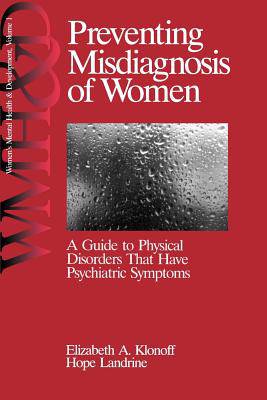
- Retrait gratuit dans votre magasin Club
- 7.000.000 titres dans notre catalogue
- Payer en toute sécurité
- Toujours un magasin près de chez vous
- Retrait gratuit dans votre magasin Club
- 7.000.0000 titres dans notre catalogue
- Payer en toute sécurité
- Toujours un magasin près de chez vous
Preventing Misdiagnosis of Women
A Guide to Physical Disorders That Have Psychiatric Symptoms
Elizabeth a Klonoff, Klonoff, Hope Landrine
216,95 €
+ 433 points
Description
Preventing Misdiagnosis of Women is a crucial resource for all therapists who treat women. Not only will the information further the well-being of women clients, but it could literally save lives. Interesting, readable, and well-organized, this book belongs on the shelf next to the DSM-IV. The case examples will grip the reader whether professional or lay audience. --Natalie Porter, Ph.D., California School of Professional Psychology "I am greatly impressed with the book. It is a brand new idea, one that is long overdue." --Hannah Lerman, Ph.D., Clinical Psychologist, Los Angeles Some clients don′t respond to a therapist′s chosen treatment for a specific mental disorder. Could there be a physical disorder that is causing psychiatric symptoms? How can a therapist distinguish between similar psychiatric and physical disorders to arrive at the correct diagnosis, refer on, and/or suggest appropriate treatment? Preventing Misdiagnosis of Women gives the therapist the foundation for identifying those physiological disorders that may be at the root of the mental problems presented by women clients. Hyperthyroidism, for example, can result in depression and anxiety, and temporal lobe epilepsy can manifest itself with the same symptoms as bipolar disorder. This special guidebook sorts out potential mix-ups by providing detailed cases and illustrations, a quick reference table for checking symptoms, and a glossary. Making technical information clear and concise, the authors cover endocrinological--including thyroid, adrenal, pituitary, and parathyroid systems--and brain seizure problems as well as other diseases--such as multiple sclerosis, mitral heart valve prolapse, and lupus erythematosus. They offer a basic overview of the systems and organs involved and focus on how particular malfunctions can result in serious behavioral problems. A guide to providing the best and most effective care to women clients, Preventing Misdiagnosis of Women presents important information about assessment and interfacing with medical professionals. All mental health and helping professionals will find this book invaluable, as will students in clinical/counseling psychology, health psychology, social work, and gender studies. "This book is informative and interesting to read. This is a text that can be read more than once and be that much more helpful in subsequent readings. . . . Preventing Misdiagnosis of Women will certainly have an impact on feminist assessment, theory, and therapy. In a broader context, it provides a foundation to spawn research hypotheses on women′s health and to reconnect the mind and body. Written accessibly even for reader without a background in physiological psychology, it fills a gap in the clinical and counseling literature. This text has far-reaching implications about the origin of psychiatric symptoms and possibly for explaining some differential rates in sex ratios for prevalence of certain psychologically based clinical syndromes. I found the text a humbling reminder of how easy it can be to miss the obvious and how easy it can be to attribute psychological explanations to symptom clusters one doesn′t understand. This book could easily become a ′required′ text for graduate students in mental health professions and mental health professionals. . . . This text will undoubtedly have an impact." --Maria P. P. Root, Ph.D., University of Washington "Preventing Misdiagnosis of Women is very good and will make an important contribution to the field. . . . The book′s message--that it is critical that differential diagnosis include consideration of both psychiatric disorders--is convincing and important to emphasize to students in graduate programs." --Helene Jackson, Ph.D., The Columbia University School of Social Work
Spécifications
Parties prenantes
- Auteur(s) :
- Editeur:
Contenu
- Nombre de pages :
- 184
- Langue:
- Anglais
- Collection :
Caractéristiques
- EAN:
- 9780761900474
- Date de parution :
- 01-11-96
- Format:
- Livre broché
- Format numérique:
- Trade paperback (VS)
- Dimensions :
- 153 mm x 233 mm
- Poids :
- 299 g

Les avis
Nous publions uniquement les avis qui respectent les conditions requises. Consultez nos conditions pour les avis.






